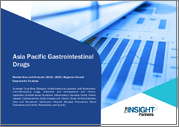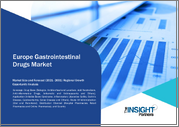
|
시장보고서
상품코드
1819717
북미의 위장약 시장 : 범위, 부문, 동향, 경쟁 분석(2021-2031년)North America Gastrointestinal Drugs Market Report 2021-2031 by Scope, Segmentation, Dynamics, and Competitive Analysis |
||||||
북미의 위장약 시장은 2023년 241억 440만 달러, 2031년에는 약 433억 6,258만 달러에 이를 것으로 예측됩니다. 2023년부터 2031년까지 CAGR 7.6%로 성장할 것으로 예상됩니다.
주요 요약 및 시장 분석
북미의 위장약 시장은 미국, 캐나다, 멕시코의 세 가지 주요 지역으로 나뉩니다. 라이프스타일 변화와 관련된 소화기 질환 발생률 증가, 이러한 질병 예방 및 치료를 위한 정부의 이니셔티브, 견고한 건강 관리 인프라, 활발한 제약 부문, 종합적인 상환 범위, 주요 제약 회사의 존재 등 여러 요인들이 이 시장의 성장을 뒷받침하고 있습니다.
시장 세분화 분석
북미의 위장약 시장은 약물 등급, 용도, 투여 경로, 유통 채널 등 다양한 부문에서 분석할 수 있습니다.
1. 약물 등급 : 시장은 생물학적 제제, 방아제 및 완하제, 산 중화제, 항염증제, 제토제, 메스꺼움 등 여러 약물 클래스로 분류됩니다. 2023년에는 생물학적 제제가 가장 큰 시장 점유율을 차지했는데, 이는 소화기 질환의 치료에서 생물학적 제제의 중요성이 증가함을 반영합니다.
2. 용도 : 시장은 용도별로 구분되며, 과민성 장 증후군(IBS), 궤양성 대장염과 크론병 등의 염증성 장 질환(IBD), 위장염, 세리악병 등의 질환이 포함됩니다. IBS 부문은 2023년에 가장 큰 점유율을 차지하며, 이 병태를 표적으로 하는 치료에 대한 큰 수요를 보여줍니다.
3. 투여 경로 : 위장약 시장은 경구 투여와 비경구 투여로 나뉩니다. 경구 약물은 편의성과 사용 편의성에서 선호되는 경우가 많기 때문에 2023년에는 경구 투여 부문이 시장을 독점했습니다.
4. 유통 채널 : 위장약 유통은 병원 약국, 소매 약국, 온라인 약국으로 구분됩니다. 2023년에는 병원 약국이 시장의 최대 점유율을 차지하며, 이러한 약제의 조제에 있어서 병원의 중요한 역할을 부각하고 있습니다.
시장 전망
최근의 동향에서는 염증성 질환의 관리에 사용되는 증가하는 생물학적 제제를 중심으로 하는 첨단 치료의 개발이 급증하고 있습니다. 생물학적 제형은 염증성 장 질환(IBD)의 치료 상황에 혁명을 일으키며, 그 성공은 다른 소화 질환에 대한 응용을 촉진합니다. 이러한 약물은 질병을 일으키는 면역계의 특정 요소를 표적으로 하기 때문에 호산구성 식도염, 세리악병, 자가면역 간염 등의 질환에 효과적입니다.
생물학적 제형, 특히 항-TNF 제형은 궤양성 대장염 및 크론병의 치료에 매우 중요합니다. 휴미라, 심포니, 레미케이드 등의 유명한 약물을 포함한 이러한 약물은 염증을 촉진하는 단백질인 종양 괴사 인자 α(TNF-α)를 억제함으로써 작용합니다. 이러한 생물학적 제형의 도입은 IBD의 관리를 현저하게 향상시키고, 많은 환자들이 그 사용에 의해 관해를 얻고 있습니다. FDA는 휴미라, 팀지아, 심포니, 태국 사브리, 레미케이드, 엔티비오, 스텔라라 등 많은 생물학적 제제를 IBD 치료제로 승인하고 있습니다. 특히, vedolizumab은 크론병과 궤양성 대장염의 중등도에서 심한 경우에 대한 2차 생물학적 제제로 부상했습니다.
2024년 2월에는 Celltrion Healthcare의 Remsima SC가 IBD의 유지 요법으로 캐나다 보건부로부터 승인을 받았으며 이 분야의 기술 혁신이 더욱 진행되고 있음을 보여줍니다. 신흥 국가에서 소화기 질환의 유병률 증가도 새로운 생물학적 제제 수요를 촉진하고 시장 성장에 기여하고 있습니다.
각국의 통찰
지리적으로는 북미의 위장약 시장은 주로 미국, 캐나다, 멕시코로 구성되어 2023년에는 미국이 가장 큰 시장 점유율을 차지합니다. 미국에서 소화기 질환의 유병률 증가는 이러한 약물 수요를 촉진하는 중요한 요인입니다. 미국 크론병 및 대장염 재단(Crohn's & Colitis Foundation of America)에 따르면, 크론병이나 궤양성 대장염 등의 질환은 특히 만연하고 있으며, 연간 약 7만명이 새롭게 진단되고 있습니다. IBD의 전반적인 유병률은 2011년에서 2020년에 걸쳐 현저하게 증가하고 있으며, 약 240만명의 미국인이 병을 앓고 있는 것으로 추정되고 있습니다.
소화기 질환의 연구개발에 대한 자금 제공 증가로 신규 치료 옵션에 대한 주목이 높아질 것으로 예측됩니다. 예를 들어, 크론병 연구는 2022년에 9,000만 달러의 자금을 투입하고, 치료법의 진보를 향한 대처를 강조하고 있습니다.
미국 FDA에 의한 신약 승인도 시장 성장을 뒷받침할 것으로 예측됩니다. 예를 들어, 2020년 5월에 FDA는 진행성 위장관 간질 종양의 치료제로서 Qinlock을 승인했고, 2024년 5월에는 Strides Pharma사가 다양한 소화 질환의 치료제로서 Sucralfate Oral Suspension의 제네릭 의약품 승인을 취득했습니다.
기업 프로파일
북미의 위장약 시장의 주요 기업은 Sanofi SA, GSK Plc, Johnson & Johnson, Bausch Health Companies Inc, AstraZeneca Plc, Takeda Pharmaceutical, AbbVie Inc, Bayer AG, Celtrion Inc, Pfizer Inc 등이 있습니다. 이러한 기업들은 시장에서의 존재감을 높이고 소비자에게 혁신적인 솔루션을 제공하기 위해 사업 확대, 제품 혁신, M&A 등 다양한 전략을 채택하고 있습니다.
목차
제1장 서론
제2장 주요 요약
- 주요 인사이트
제3장 조사 방법
- 2차 조사
- 1차 조사
- 가설 책정
- 거시경제 요인분석
- 기초 수치 개발
- 데이터 삼각측량
- 국가 레벨 데이터
제4장 북미의 위장약 시장 상황
- PEST 분석
제5장 북미의 위장약 시장 : 주요 시장 역학
- 시장 성장 촉진요인
- 소화기 질환 환자 증가
- 생물 제제 개발 증가
- 시장 성장 억제요인
- 생물학적 제제 고비용
- 중증 궤양성 대장염 또는 크론병에 대한 생물학적 제형의 평균 비용
- 시장 기회
- 기업에 의한 전략적 이니셔티브
- 향후의 동향
- 신약 개발과 인공지능 기반 기술을 위한 연구투자 증가
- 성장 촉진요인과 억제요인의 영향
제6장 위장약 시장-북미 분석
- 북미의 위장약 시장의 수익, 2021년-2031년
제7장 북미의 위장약 시장 분석 : 약제 등급별
- 생물제제
- 지사약과 완하제
- 산 중화제
- 항 염증제
- 구토 방지제 및 항종양제
- 기타
제8장 북미의 위장약 시장 분석 : 용도별
- 과민성 장 증후군
- 염증성 궤양성 대장염
- 크론병
- 위장염
- 세리악병
- 기타
제9장 북미의 위장약 시장 분석 : 투여 경로별
- 경구
- 비경구
제10장 북미의 위장약 시장 분석 : 유통 경로별
- 병원 약국
- 소매 약국
- 온라인 약국
제11장 북미의 위장약 시장 : 국가별 분석
- 북미
- 미국
- 캐나다
- 멕시코
제12장 업계 정세
- 북미의 위장약 시장에서의 성장 전략
- 유기적 성장 전략
- 무기적 성장 전략
제13장 기업 프로파일
- Sanofi SA
- GSK Plc
- Johnson & Johnson
- Bausch Health Companies Inc
- AstraZeneca Plc
- Takeda Pharmaceutical Co Ltd
- AbbVie Inc
- Bayer AG
- Celltrion Inc
- Pfizer Inc
제14장 부록
SHW 25.10.01The North America gastrointestinal drugs market is projected to grow significantly, reaching an estimated US$ 43,362.58 million by 2031, up from US$ 24,104.40 million in 2023. This growth represents a compound annual growth rate (CAGR) of 7.6% from 2023 to 2031.
Executive Summary and Market Analysis
The gastrointestinal drugs market in North America is divided into three primary regions: the United States, Canada, and Mexico. Several factors are driving the growth of this market, including the rising incidence of gastrointestinal disorders linked to lifestyle changes, government initiatives aimed at the prevention and treatment of these diseases, a robust healthcare infrastructure, a thriving pharmaceutical sector, comprehensive reimbursement coverage, and the presence of major pharmaceutical companies.
Market Segmentation Analysis
The North America gastrointestinal drugs market can be analyzed through various segments, including drug class, application, route of administration, and distribution channel.
1. Drug Class: The market is categorized into several drug classes, including biologics, antidiarrheal and laxatives, acid neutralizers, anti-inflammatory drugs, antiemetic and antinauseants, among others. In 2023, biologics accounted for the largest market share, reflecting their growing importance in treating gastrointestinal conditions.
2. Application: The market is also segmented by application, which includes conditions such as irritable bowel syndrome (IBS), inflammatory bowel diseases (IBD) like ulcerative colitis and Crohn's disease, gastroenteritis, celiac disease, and others. The IBS segment held the largest share in 2023, indicating a significant demand for treatments targeting this condition.
3. Route of Administration: The gastrointestinal drugs market is divided into oral and parenteral routes of administration. The oral segment dominated the market in 2023, as oral medications are often preferred for their convenience and ease of use.
4. Distribution Channel: The distribution of gastrointestinal drugs is segmented into hospital pharmacies, retail pharmacies, and online pharmacies. Hospital pharmacies represented the largest share of the market in 2023, highlighting the critical role of hospitals in dispensing these medications.
Market Outlook
Recent years have seen a surge in the development of advanced treatments, particularly biologics, which are increasingly used for managing inflammatory diseases. Biologics have revolutionized the treatment landscape for inflammatory bowel diseases (IBD), and their success has encouraged their application in other gastrointestinal disorders. These drugs target specific elements of the immune system that contribute to disease, making them effective for conditions such as eosinophilic esophagitis, celiac disease, and autoimmune hepatitis.
Biologics, particularly anti-TNF agents, have been pivotal in managing ulcerative colitis and Crohn's disease. These agents, which include well-known medications like Humira, Simponi, and Remicade, work by blocking tumor necrosis factor-alpha (TNF-alpha), a protein that promotes inflammation. The introduction of these biologics has significantly improved the management of IBD, with many patients achieving remission through their use. The FDA has approved numerous biologic drugs for IBD treatment, including Humira, Cimzia, Simponi, Tysabri, Remicade, Entyvio, and Stelara. Notably, Vedolizumab has emerged as a preferred second-line biologic for moderate to severe cases of Crohn's disease and ulcerative colitis.
In February 2024, Celltrion Healthcare's Remsima SC received approval from Health Canada for maintenance therapy in IBD, further illustrating the ongoing innovation in this field. The increasing prevalence of gastrointestinal diseases in developing countries is also driving the demand for new biologics, contributing to market growth.
Country Insights
Geographically, the North American gastrointestinal drugs market is primarily composed of the US, Canada, and Mexico, with the US holding the largest market share in 2023. The rising prevalence of gastrointestinal diseases in the US is a significant factor driving demand for these drugs. Conditions such as Crohn's disease and ulcerative colitis are particularly prevalent, with approximately 70,000 new cases diagnosed annually, according to the Crohn's & Colitis Foundation of America. The overall prevalence of IBD has increased notably from 2011 to 2020, with estimates suggesting that around 2.4 million Americans are affected.
Increased funding for research and development in gastrointestinal diseases is expected to enhance the focus on novel treatment options. For instance, Crohn's disease research received US$ 90 million in funding in 2022, underscoring the commitment to advancing treatment options.
The US FDA's approval of new drugs is also anticipated to bolster market growth. For example, in May 2020, the FDA approved Qinlock for advanced gastrointestinal stromal tumors, and in May 2024, Strides Pharma received approval for a generic version of Sucralfate Oral Suspension for various gastrointestinal conditions.
Company Profiles
Key players in the North America gastrointestinal drugs market include Sanofi SA, GSK Plc, Johnson & Johnson, Bausch Health Companies Inc, AstraZeneca Plc, Takeda Pharmaceutical Co Ltd, AbbVie Inc, Bayer AG, Celltrion Inc, and Pfizer Inc. These companies are employing various strategies, including expansion, product innovation, and mergers and acquisitions, to enhance their market presence and offer innovative solutions to consumers.
Table Of Contents
1. Introduction
- 1.1 The Insight Partners Research Report Guidance
- 1.2 Market Segmentation
2. Executive Summary
- 2.1 Key Insights
3. Research Methodology
- 3.1 Secondary Research
- 3.2 Primary Research
- 3.2.1 Hypothesis formulation:
- 3.2.2 Macro-economic factor analysis:
- 3.2.3 Developing base number:
- 3.2.4 Data Triangulation:
- 3.2.5 Country level data:
4. North America Gastrointestinal Drugs Market Landscape
- 4.1 Overview
- 4.2 PEST Analysis
5. North America Gastrointestinal Drugs Market - Key Market Dynamics
- 5.1 Market Drivers
- 5.1.1 Rising Cases of Gastrointestinal Diseases
- 5.1.2 Increasing Development of Biologics
- 5.2 Market Restraints
- 5.2.1 High Cost of Biologics
- 5.2.2 Average Cost of Biologic Drugs for Severe Ulcerative Colitis or Crohn's Disease
- 5.3 Market Opportunities
- 5.3.1 Strategic Initiatives by Companies
- 5.4 Future Trends
- 5.4.1 Increasing Research Investment for Novel Drug Development and Artificial Intelligence-Based Techniques
- 5.5 Impact of Drivers and Restraints:
6. Gastrointestinal Drugs Market - North America Analysis
- 6.1 North America Gastrointestinal Drugs Market Revenue (US$ Million), 2021-2031
7. North America Gastrointestinal Drugs Market Analysis - by Drug Class
- 7.1 Biologics
- 7.1.1 Overview
- 7.1.2 Biologics: North America Gastrointestinal Drugs Market - Revenue and Forecast to 2031 (US$ Million)
- 7.2 Antidiarrheal and Laxatives
- 7.2.1 Overview
- 7.2.2 Antidiarrheal and Laxatives: North America Gastrointestinal Drugs Market - Revenue and Forecast to 2031 (US$ Million)
- 7.3 Acid Neutralizers
- 7.3.1 Overview
- 7.3.2 Acid Neutralizers: North America Gastrointestinal Drugs Market - Revenue and Forecast to 2031 (US$ Million)
- 7.4 Anti-inflammatory Drugs
- 7.4.1 Overview
- 7.4.2 Anti-inflammatory Drugs: North America Gastrointestinal Drugs Market - Revenue and Forecast to 2031 (US$ Million)
- 7.5 Antiemetic and Antinauseants
- 7.5.1 Overview
- 7.5.2 Antiemetic and Antinauseants: North America Gastrointestinal Drugs Market - Revenue and Forecast to 2031 (US$ Million)
- 7.6 Others
- 7.6.1 Overview
- 7.6.2 Others: North America Gastrointestinal Drugs Market - Revenue and Forecast to 2031 (US$ Million)
8. North America Gastrointestinal Drugs Market Analysis - by Application
- 8.1 Irritable Bowel Syndrome
- 8.1.1 Overview
- 8.1.2 Irritable Bowel Syndrome: North America Gastrointestinal Drugs Market - Revenue and Forecast to 2031 (US$ Million)
- 8.2 Inflammatory Ulcerative Colitis
- 8.2.1 Overview
- 8.2.2 Inflammatory Ulcerative Colitis: North America Gastrointestinal Drugs Market - Revenue and Forecast to 2031 (US$ Million)
- 8.3 Crohn's Disease
- 8.3.1 Overview
- 8.3.2 Crohn's Disease: North America Gastrointestinal Drugs Market - Revenue and Forecast to 2031 (US$ Million)
- 8.4 Gastroenteritis
- 8.4.1 Overview
- 8.4.2 Gastroenteritis: North America Gastrointestinal Drugs Market - Revenue and Forecast to 2031 (US$ Million)
- 8.5 Celiac Disease
- 8.5.1 Overview
- 8.5.2 Celiac Disease: North America Gastrointestinal Drugs Market - Revenue and Forecast to 2031 (US$ Million)
- 8.6 Others
- 8.6.1 Overview
- 8.6.2 Others: North America Gastrointestinal Drugs Market - Revenue and Forecast to 2031 (US$ Million)
9. North America Gastrointestinal Drugs Market Analysis - by Route of Administration
- 9.1 Oral
- 9.1.1 Overview
- 9.1.2 Oral: North America Gastrointestinal Drugs Market - Revenue and Forecast to 2031 (US$ Million)
- 9.2 Parenteral
- 9.2.1 Overview
- 9.2.2 Parenteral: North America Gastrointestinal Drugs Market - Revenue and Forecast to 2031 (US$ Million)
10. North America Gastrointestinal Drugs Market Analysis - by Distribution Channel
- 10.1 Hospital Pharmacies
- 10.1.1 Overview
- 10.1.2 Hospital Pharmacies: North America Gastrointestinal Drugs Market - Revenue and Forecast to 2031 (US$ Million)
- 10.2 Retail Pharmacies
- 10.2.1 Overview
- 10.2.2 Retail Pharmacies: North America Gastrointestinal Drugs Market - Revenue and Forecast to 2031 (US$ Million)
- 10.3 Online Pharmacies
- 10.3.1 Overview
- 10.3.2 Online Pharmacies: North America Gastrointestinal Drugs Market - Revenue and Forecast to 2031 (US$ Million)
11. North America Gastrointestinal Drugs Market - Country Analysis
- 11.1 North America
- 11.1.1 North America Gastrointestinal Drugs Market Overview
- 11.1.2 North America Gastrointestinal Drugs Market - Breakdown, by Key Countries, 2023 and 2031 (%)
- 11.1.2.1 United States: North America Gastrointestinal Drugs Market - Revenue and Forecast to 2031 (US$ Million)
- 11.1.2.1.1 United States: North America Gastrointestinal Drugs Market Breakdown, by Drug Class
- 11.1.2.1.2 United States: North America Gastrointestinal Drugs Market Breakdown, by Application
- 11.1.2.1.3 United States: North America Gastrointestinal Drugs Market Breakdown, by Route Of Administration
- 11.1.2.1.4 United States: North America Gastrointestinal Drugs Market Breakdown, by Distribution Channel
- 11.1.2.2 Canada: North America Gastrointestinal Drugs Market - Revenue and Forecast to 2031 (US$ Million)
- 11.1.2.2.1 Canada: North America Gastrointestinal Drugs Market Breakdown, by Drug Class
- 11.1.2.2.2 Canada: North America Gastrointestinal Drugs Market Breakdown, by Application
- 11.1.2.2.3 Canada: North America Gastrointestinal Drugs Market Breakdown, by Route Of Administration
- 11.1.2.2.4 Canada: North America Gastrointestinal Drugs Market Breakdown, by Distribution Channel
- 11.1.2.3 Mexico: North America Gastrointestinal Drugs Market - Revenue and Forecast to 2031 (US$ Million)
- 11.1.2.3.1 Mexico: North America Gastrointestinal Drugs Market Breakdown, by Drug Class
- 11.1.2.3.2 Mexico: North America Gastrointestinal Drugs Market Breakdown, by Application
- 11.1.2.3.3 Mexico: North America Gastrointestinal Drugs Market Breakdown, by Route Of Administration
- 11.1.2.3.4 Mexico: North America Gastrointestinal Drugs Market Breakdown, by Distribution Channel
- 11.1.2.1 United States: North America Gastrointestinal Drugs Market - Revenue and Forecast to 2031 (US$ Million)
12. Industry Landscape
- 12.1 Overview
- 12.2 Growth Strategies in North America Gastrointestinal Drugs Market
- 12.3 Organic Growth Strategies
- 12.3.1 Overview
- 12.4 Inorganic Growth Strategies
- 12.4.1 Overview
13. Company Profiles
- 13.1 Sanofi SA
- 13.1.1 Key Facts
- 13.1.2 Business Description
- 13.1.3 Products and Services
- 13.1.4 Financial Overview
- 13.1.5 SWOT Analysis
- 13.1.6 Key Developments
- 13.2 GSK Plc
- 13.2.1 Key Facts
- 13.2.2 Business Description
- 13.2.3 Products and Services
- 13.2.4 Financial Overview
- 13.2.5 SWOT Analysis
- 13.2.6 Key Developments
- 13.3 Johnson & Johnson
- 13.3.1 Key Facts
- 13.3.2 Business Description
- 13.3.3 Products and Services
- 13.3.4 Financial Overview
- 13.3.5 SWOT Analysis
- 13.3.6 Key Developments
- 13.4 Bausch Health Companies Inc
- 13.4.1 Key Facts
- 13.4.2 Business Description
- 13.4.3 Products and Services
- 13.4.4 Financial Overview
- 13.4.5 SWOT Analysis
- 13.4.6 Key Developments
- 13.5 AstraZeneca Plc
- 13.5.1 Key Facts
- 13.5.2 Business Description
- 13.5.3 Products and Services
- 13.5.4 Financial Overview
- 13.5.5 SWOT Analysis
- 13.5.6 Key Developments
- 13.6 Takeda Pharmaceutical Co Ltd
- 13.6.1 Key Facts
- 13.6.2 Business Description
- 13.6.3 Products and Services
- 13.6.4 Financial Overview
- 13.6.5 SWOT Analysis
- 13.6.6 Key Developments
- 13.7 AbbVie Inc
- 13.7.1 Key Facts
- 13.7.2 Business Description
- 13.7.3 Products and Services
- 13.7.4 Financial Overview
- 13.7.5 SWOT Analysis
- 13.7.6 Key Developments
- 13.8 Bayer AG
- 13.8.1 Key Facts
- 13.8.2 Business Description
- 13.8.3 Products and Services
- 13.8.4 Financial Overview
- 13.8.5 SWOT Analysis
- 13.8.6 Key Developments
- 13.9 Celltrion Inc
- 13.9.1 Key Facts
- 13.9.2 Business Description
- 13.9.3 Products and Services
- 13.9.4 Financial Overview
- 13.9.5 SWOT Analysis
- 13.9.6 Key Developments
- 13.10 Pfizer Inc
- 13.10.1 Key Facts
- 13.10.2 Business Description
- 13.10.3 Products and Services
- 13.10.4 Financial Overview
- 13.10.5 SWOT Analysis
- 13.10.6 Key Developments
14. Appendix
- 14.1 About The Insight Partners
- 14.2 Glossary of Terms



















